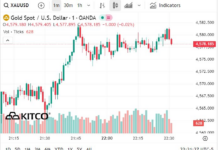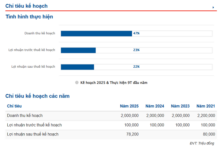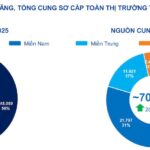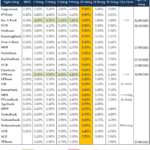Experts pinpoint five potential risks to the real estate market and the economy if the proposed measure is implemented.
Proposal contradicts market principles
Dr. Truong Van Phuoc – Former Acting Chairman of the National Financial Supervisory Commission, former standing member of the Prime Minister’s Economic Advisory Council
Dr. Truong Van Phuoc stated, “The policy is correct, but the solution is not feasible. Banning or restricting banks’ lending rights is an administrative approach that contradicts the principles of a market economy—a status Vietnam has worked hard to achieve international recognition for.”
From a policy perspective, Dr. Phuoc believes state intervention is necessary but must be targeted and appropriate. Specifically, the government should remove legal obstacles to enable businesses to implement projects faster, thereby increasing market supply.
Importantly, the government can implement specific policies to reduce input costs for businesses rather than tightening capital outflow. One critical factor is land use fees, which currently account for a significant portion of housing costs.
“Land is owned by the people, with the state acting as the representative owner and unified manager. The state can set lower land use fees to reduce costs for businesses. When input costs decrease, housing prices will naturally drop. This is a reasonable market intervention,” Mr. Phuoc emphasized.

Dr. Truong Van Phuoc affirms that the Ministry of Construction’s policy is correct, but the solution is not feasible.
Impact on banking operations and monetary policy
Dr. Dinh The Hien – Director of the Institute for Informatics and Applied Economics
According to economist Dinh The Hien, the Ministry of Construction aims to curb real estate speculation to cool the market. However, the draft appears to interfere with the operational capital market of banks and monetary policy. The real estate market, in particular, and the financial credit market, in general, require long-term stability, not short-term solutions.
Mr. Hien also noted that limiting lending could reduce market flexibility, causing significant impacts. The real estate sector still faces challenges and has not met the housing demands of the majority in major cities. Therefore, policies should take a broader, more comprehensive view, balancing social welfare and economic development, rather than solely focusing on reducing housing prices in major cities like Ho Chi Minh City.
Mr. Hien suggested that instead of tightening credit, banks should focus on proper appraisal functions, avoiding loans for “paper-only” projects, overpriced projects, or borrowers without repayment capacity. Banks should also enhance supervision standards and upgrade credit officers to ensure compliance with professional practices.
Risk of a “frozen” real estate market
Tran Khanh Quang (General Director of Viet An Hoa Real Estate Investment Company)
According to Tran Khanh Quang, restricting loans for second or third home buyers aims to limit real estate speculation and stabilize prices but could negatively impact market recovery.
While real estate prices are rising, the increase is uneven, concentrated in specific segments and areas such as new projects, auction areas, and apartment segments, with some instances of “price manipulation.” Many real estate investors still face difficulties, particularly those holding townhouses and land plots, as the market has not fully recovered.
In reality, investors account for a significant portion of new projects, around 60-70% or more. Tightening credit will immediately affect the liquidity of new projects, dampening market sentiment. As sentiment declines, developers will also reduce market participation, potentially decreasing the supply of actual housing products.
Therefore, the key is to create “real supply for real demand.” It is essential to increase the supply of social housing for low-income individuals and affordable housing for middle-income earners, rather than relying on administrative interventions.
Potential for reverse impact, driving housing prices higher
Dr. Nguyen Van Dinh, Vice Chairman of the Vietnam Real Estate Association, Chairman of the Vietnam Real Estate Brokerage Association (VARS)
According to Mr. Dinh, restricting credit for second or subsequent home buyers directly reduces demand, impacting supply due to decreased consumption and lower revenue for businesses. Developers may then reduce supply, potentially driving housing prices higher, contrary to the initial goal.
Mr. Dinh cited China’s experience as a clear example. Tightening credit did not lower housing prices but caused economic decline and widespread business bankruptcies. When capital flow is restricted, the market freezes, businesses struggle, and access to housing becomes more difficult for citizens.

Dr. Nguyen Van Dinh highlights China’s experience as a clear example. Tightening credit did not lower housing prices but caused economic decline.
Creating difficulties for genuine buyers
Dr. Ngo Gia Hoang (University of Law, Ho Chi Minh City)
From the buyer’s perspective, Dr. Ngo Gia Hoang analyzed that second or subsequent home buyers are not automatically speculators. Many purchase second homes for genuine needs, such as living closer to work, accommodating elderly parents, or providing housing for children attending school, or for long-term rental income (legal investment, not speculative flipping).
In reality, countries only tax vacant properties—taxes levied on completed but unoccupied, unused, or unrented properties for a short period. Therefore, restricting citizens who purchase second or subsequent homes but use them and pay taxes fully is not appropriate. Rigid regulations could reduce market liquidity and indirectly affect real estate businesses and commercial banks.
Experts agree that a comprehensive approach is needed to bring housing prices to reasonable levels:
First, increase the supply of affordable housing and social housing.
Second, streamline administrative procedures, expedite approvals, and land allocation.
Third, reform taxes and fees targeting unused properties.
Fourth, develop a transparent land and housing database to prevent artificial pricing.
Surge in Real Estate Interest Shocks Hanoi and Ho Chi Minh City Markets
In Hanoi, the real estate market is experiencing a notable resurgence in interest, with property prices continuing to rise. After a prolonged period of stagnation, the market has entered a clear recovery phase, marked by growth in both sales prices and investor engagement.
Unlock Property Price Reductions: The Key Lies in Dramatically Boosting Supply
Proposed restrictions on loans for purchasing second homes and beyond aim to curb real estate speculation and price inflation. However, to effectively lower property prices, more comprehensive and coordinated solutions are essential.












































